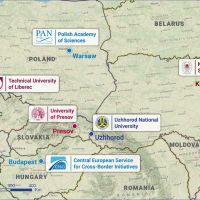The territorial analysis of the Hungary-Slovakia-Romania-Ukraine NEXT Programme has been closed
Planning | 18 December 2020
Planning | 18 December 2020
As previously reported, the nearly one year work-cycle at CESCI dedicated for the elaboration of the territorial analyses, concerning three cross-border cooperation programmes is finishing in 2020. Both the analysis for the Interreg Slovakia-Hungary Cross-border Cooperation Programme and the Interreg-IPA Cross-border Cooperation Programme Hungary-Serbia are publicly available. As for the Hungary-Slovakia-Romania-Ukraine NEXT Programme of 2021-2027, the opinion-forming process of the first reading of the territorial analysis was recently closed.
Between the 16th and 20th of November 2020 we organised four online webinars (one in each languages with English translation, i.e. Hungarian, Romanian, Slovakian and Ukrainian) which played a significant role in validating the results stemming from the territorial analysis’ varied methods such as data analysis, document analysis, online questionnaire etc. because it invited the local stakeholders and the experts of different sectors to express their opinions on the findings in a quantifiable and qualifiable way. The lists of participants were primarily compiled by the Managing Authority with the involvement of participating counties and with the help of the JTS focusing on the affected counties, municipalities, water directorates, development agencies, hospitals, universities, NGOs among others. The open invitation was also published on the website of the programme.
During the webinars the findings have been presented following which the participants were asked to vote on the importance and relevance of each subtopic discussed by the territorial analysis. This way the participants had a chance to directly influence the programming process and underline those areas that need the most attention according to their experiences. Furthermore, the online webinars also offered a convenient platform for the local stakeholders and experts to enter into a meaningful dialogue with the strategic planners writing the territorial analysis and call their attention on any points that might need modifications or certain aspects that might be missing from the analysis. This way it is ensured that the territorial analysis truly mirrors the local needs.
On the 16th of December the Programming Committee’s meeting took place where Kitti Dubniczki, chief planner of CESCI presented the document. Following a detailed discussion, the PC members unequivocally accepted the analysis which is expected to be soon uploaded to the programme’s website.

 Muraba EGTC Family Friendly Workplace Award
Muraba EGTC Family Friendly Workplace Award